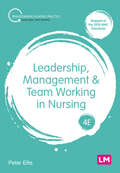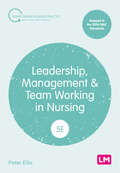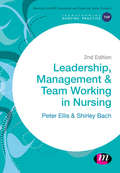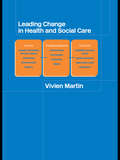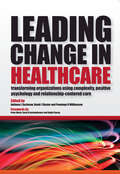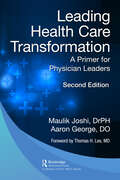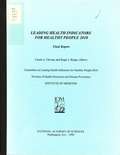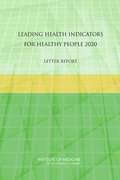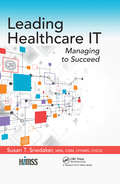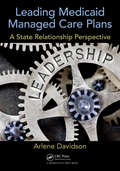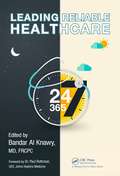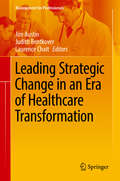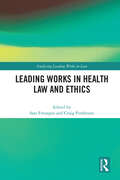- Table View
- List View
Leadership, Management and Team Working in Nursing (Transforming Nursing Practice Series)
by Peter EllisLeadership is central to all aspects of the nursing role, from managing the delivery of high quality care to acting as a role model for best practice. Written specifically for nursing students, this book introduces you to the principles and practice of leadership, management and multi-disciplinary team working. Key features: o Each chapter is mapped to the 2018 NMC standards o Introduces the core leadership theory you need to know, using case studies and reflective activities to show how it relates to your practice o Updated throughout including new content on the impact of COVID-19 and increased coverage of emotional intelligence and resilience o Builds your understanding of the challenging aspects of leadership including managing conflict, being assertive and leading service improvement
Leadership, Management and Team Working in Nursing (Transforming Nursing Practice Series)
by Peter EllisLeadership is central to all aspects of the nursing role, from managing the delivery of high quality care to acting as a role model for best practice. Written specifically for nursing students, this book introduces you to the principles and practice of leadership, management and multi-disciplinary team working. Key features: o Each chapter is mapped to the 2018 NMC standards o Introduces the core leadership theory you need to know, using case studies and reflective activities to show how it relates to your practice o Updated throughout including new content on the impact of COVID-19 and increased coverage of emotional intelligence and resilience o Builds your understanding of the challenging aspects of leadership including managing conflict, being assertive and leading service improvement
Leadership, Management and Team Working in Nursing (Transforming Nursing Practice Series)
by Peter EllisLeadership is central to all aspects of the nursing role, from managing the delivery of high quality care to acting as a role model for best practice. Written specifically for nursing students, this book introduces you to the principles and practice of leadership, management and multi-disciplinary team working. Key features: Each chapter is mapped to the 2018 NMC Standards Introduces the core leadership theory you need to know, using case studies and reflective activities to show how it relates to your practice Updated throughout, including new activities and discussions of compassionate leadership, interprofessional working frameworks and emotional intelligence. Builds your understanding of the challenging aspects of leadership including delegation, managing conflict, being assertive and leading service improvement
Leadership, Management and Team Working in Nursing (Transforming Nursing Practice Series)
by Peter EllisLeadership is central to all aspects of the nursing role, from managing the delivery of high quality care to acting as a role model for best practice. Written specifically for nursing students, this book introduces you to the principles and practice of leadership, management and multi-disciplinary team working. Key features: Each chapter is mapped to the 2018 NMC Standards Introduces the core leadership theory you need to know, using case studies and reflective activities to show how it relates to your practice Updated throughout, including new activities and discussions of compassionate leadership, interprofessional working frameworks and emotional intelligence. Builds your understanding of the challenging aspects of leadership including delegation, managing conflict, being assertive and leading service improvement
Leadership, Management and Team Working in Nursing (Transforming Nursing Practice)
by Peter Ellis Dr Shirley BachTransforming Nursing Practice is a series tailor made for pre-registration student nurses. Each book in the series is: · Affordable · Mapped to the NMC Standards and Essential Skills Clusters · Focused on applying theory to practice · Full of active learning features 'The set of books is an excellent resource for students. The series is small, easily portable and valuable. I use the whole set on a regular basis.' Fiona Davies, Senior Nurse Lecturer, University of Derby Whatever stage you are at in your nursing career leadership, management and team working skills will be central to your role as a modern nurse. The book has been carefully crafted to equip you with these skills helping you to understand why leadership and management is so important, how it fits in with your daily practice and what the key theory and knowledge is. It will be a valuable resource for all three years of the nursing degree and a tool to help you grow into a nurse leader of the future. Key features: · Written with the needs of student nurses firmly in mind with activities and case studies that bring theory to life · Linked to the latest NMC Standards and Essential Skills Clusters for pre-registration nursing education · Provides practical guidance on the immediate challenges that the new nurse will face About the Authors Peter Ellis is Nursing Director at Hospice in the Weald, Pembury, Kent. Shirley Bach is Head of the School of Health Sciences at the University of Brighton.
Leading And Managing In Nursing
by Patricia S. Yoder-Wise Susan SportsmanGain a solid foundation in nursing leadership and management skills! Using real-world examples, Leading and Managing in Nursing, 8th Edition helps you learn to provide caring, compassionate, and professional nursing leadership. Topics range from core concepts to knowing yourself, knowing the organization, communication and conflict, managing stress, delegating, staffing and scheduling, and managing costs and budgets. New to this edition are Next Generation NCLEX® exam-style case studies, three new chapters, and updated guidelines to evidence-based practice. Written by a team of nursing educators and practitioners led by Patricia S. Yoder-Wise and Susan Sportsman, this book combines theory, research, and practical application to help you succeed in an ever-changing healthcare environment.
Leading Change Through Evaluation: Improvement Science in Action (Evaluation in Practice Series)
by Kristen L. RohannaEvaluators who are interested in developing or improving a program or policy frequently look to formative evaluation as a guiding framework.This book shows why those hoping to use evaluation to drive change in complex systems, rather than develop or improve one program, policy, or product, need to shift from the oversimplified idea of formative evaluation to a more specified continuous improvement model grounded in improvement science. In doing so, author Kristen L. Rohanna provides guidance to both evaluators and others, such as K-12 educators or hospital administrators, who lead improvement initiatives in their organizations and seek to solve persistent problems of practice. The book includes an extended case study: a networked improvement community of five public middle and high schools.
Leading Change Through Evaluation: Improvement Science in Action (Evaluation in Practice Series)
by Kristen L. RohannaEvaluators who are interested in developing or improving a program or policy frequently look to formative evaluation as a guiding framework.This book shows why those hoping to use evaluation to drive change in complex systems, rather than develop or improve one program, policy, or product, need to shift from the oversimplified idea of formative evaluation to a more specified continuous improvement model grounded in improvement science. In doing so, author Kristen L. Rohanna provides guidance to both evaluators and others, such as K-12 educators or hospital administrators, who lead improvement initiatives in their organizations and seek to solve persistent problems of practice. The book includes an extended case study: a networked improvement community of five public middle and high schools.
Leading Change in Health and Social Care
by Vivien MartinLearning is at the heart of change. This book breaks new ground in exploring the need for individuals to engage in personal change, through learning, as an essential part of achieving significant change in organisations. It explains how to engage with people's energy, enthusiasm and abilities to enable them to think and do things differently.Providing an overview of leadership theories and a practical guide to management tools and techniques, Leading Change in Health and Social Care is illustrated throughout with examples drawn from health and social care settings. Key topics covered include:* contemporary models of transformational leadership* learning as the foundation of personal and organisational change* systems thinking as a way of understanding change in complex services* visions of a better future and how to develop them* values and how they influence our choice of direction* inspiring ourselves and others to take action.This is a book for everyone who wants to improve health and social care services and enhance the experience of patients and service users. It assumes no previous knowledge of change management and is appropriate for students, teachers, trainers and professionals.
Leading Change in Healthcare: Transforming Organizations Using Complexity, Positive Psychology and Relationship-Centered Care
by Anthony L SuchmanThe challenge of transforming organizational culture is at the heart of many key movements in contemporary healthcare, and understanding culture change has become a core leadership competency. However, much current practice is based on antiquated and psychologically unsophisticated theories, leaving leaders inadequately prepared for the complex task of implementing change. Leading Change in Healthcare presents relationship-centered administration, an effective new evidence-based alternative to traditional culture change methodologies. It integrates fresh insights and methods from complexity science, positive psychology and relationship-centered care, enabling a more spontaneous and reflective approach to change management. This fosters greater organizational awareness and real participation, as well as improved productivity and creativity, as well as staff recruitment and retention. Case studies drawn from primary care, hospitals, long-term care, professional education, international NGOs and other settings, rather than emphasizing the end results, are demonstrations of how to apply relationship-centered administration in everyday practice. Leading Change in Healthcare is a key resource for all practitioners, students and teachers of healthcare management, medical educators, and leaders in all areas of healthcare provision. 'We need a new way of seeing, a new way of leading - and the authors provide a clear guide and resources for the path ahead. Leading Change in Healthcare offers hope - and a method. A daily dose is just what the change doctor ordered.' from the Foreword by Carol Aschenbrener.
Leading Health Care Transformation: A Primer for Physician Leaders
by Maulik Joshi, Dr.P.H. Aaron George, DO"Readers should go broad and go deep with this book. Readers who do both will find this book a valuable framework for approaching the complexities of leading health care organizations today…it will provide a framework for approaching the work, and that framework is one likely to lead to business success and personal satisfaction." —From the Foreword by Thomas H. Lee, MD, Chief Medical Officer, Press Ganey and Senior Physician, Brigham and Women’s Hospital The U.S. health care system continues to undergo transformation, with a rate of change that has accelerated in recent years. This rapidly evolving field requires a new level of astute clinical leadership. The bottom line is that physician leadership will be the key ingredient for any dramatic change in our health care system and a fundamental driver of outcomes for patients and communities. Leading Heath Care Transformation prepares physician leaders with the evidence, tools, and ideas to make and lead systemic improvement. This second edition provides fresh insights, new evidence, and modern topics with revised and updated chapters. Each chapter is complete with contemporary evidence, pragmatic case studies, lessons learned, and action steps for physician leaders. This second edition of Leading Health Care Transformation is a succinct and practical primer on 16 key topics in health care transformation. Physician leadership is critical to transform care; this book will help guide the way.
Leading Health Indicators for Healthy People 2010: Final Report
by Institute of MedicineA report on Leading Health Indicators for Healthy People 2010
Leading Health Indicators for Healthy People 2010: Second Interim Report
by Committee on Leading Health Indicators for Healthy People 2010The National Academies Press (NAP)--publisher for the National Academies--publishes more than 200 books a year offering the most authoritative views, definitive information, and groundbreaking recommendations on a wide range of topics in science, engineering, and health. Our books are unique in that they are authored by the nation's leading experts in every scientific field.
Leading Health Indicators for Healthy People 2020: Letter Report
by Institute of Medicine of the National AcademiesStarting in 1990, the Department of Health and Human Services (HHS) has issued a national agenda aimed at improving the health of all Americans over the 10-year span. At the request of HHS, the IOM identified a set of leading health indicators that could be used by Healthy People 2020 and developed a conceptual framework within which the topics, indicators, and objectives would be developed or selected.
Leading Healthcare IT: Managing to Succeed (HIMSS Book Series)
by Susan T. SnedakerHealthcare IT is a complex and rapidly evolving field. Success in this arena requires the ability to create a vision, set a strategy, foster collaboration, develop a plan and execute flawlessly every day. This book provides a clear, concise roadmap for professionals who currently manage, direct or oversee healthcare IT. Through case studies and examples, the author includes highly relevant topics such as delivering and communicating HIT values, managing information security, and connectivity challenges, as well as organizational strategy, alignment and vision of HIT, risk management, performance management and process improvement using Lean methodologies.
Leading High-Reliability Organizations in Healthcare
by Richard MorrowThis book details the attributes and practices that help high-reliability organizations (HROs) excel in the service they provide to their customers. Explaining what it takes to achieve high reliability in healthcare settings, it presents proven tools and concepts that leading healthcare organizations are using to improve safety and quality. The book identifies the necessary infrastructure, methods, and analytics required to achieve and sustain higher reliability. It also includes case studies that illustrate success stories and failures, so readers can avoid making the same mistakes.
Leading Interprofessional Teams in Health and Social Care
by Vivien Martin Anita RogersThe move to multidisciplinary teams in primary care and the emphasis on joined-up working across the human services make it increasingly necessary for health and social care professionals to take on a variety of leadership roles in teams made up of people from different professional backgrounds. This sort of leadership requires different skills from those required when working in the context of a single profession familiar to every member of the team.In Leading Interprofessional Teams in Health and Social Care, the authors use detailed case-studies to explore these skills. Nurses, social workers and other health and social care professionals, specialists and managers are included in the case-studies to demonstrate how leadership and teamworking roles can be taken in different ways and in different circumstances. The final section of the book presents an analysis of the case-studies to draw out the key issues and discusses how readers might develop themselves to be successful leaders and team members in these diverse settings.
Leading Medicaid Managed Care Plans: A State Relationship Perspective
by Arlene DavidsonLeading Medicaid Managed Care Plans examines leadership actions necessary to successfully operate a Medicaid managed care plan with emphasis on the relationship with the state Medicaid agency the health plan is contracted with. With appropriate operational and governance oversight, and with solid mutually respectful relationships with the state agency, Medicaid health plans are more likely to sustain success and prosperity for the long term. The approach of Leading Medicaid Managed Care Plans builds on key infrastructure elements that need to be in place when contracting with a state agency, and for overall success of the organization. It takes a pragmatic and methodical approach, interspersed with real-life examples of what to do for success and what actions to avoid that frequently lead to failure. This approach is different from most managed care books (Medicaid or otherwise) as those mostly focus on the process of the business (such as details around claims payment, or provider contracting) and ignore the role of the state Medicaid agency and its importance in retaining the contractual relationship. This book differs also on its emphasis on organizational foundational elements and strategic leadership skills necessary to sustain success. The author has years of experience in turning around failing Medicaid managed care plans and observing what they all had in common that contributed to those failures. One common feature was the deterioration of the relationship with the state Medicaid agency they were contracted with, and how close they all came to losing their multi-million dollar businesses. The purpose of this book is to educate and inspire managed care executives and senior leaders who operate Medicaid health plans and to help them understand what elements are needed for successful health plans and a sustainable relationship with the people directing the state Medicaid agency.
Leading Pharmaceutical Innovation: Trends And Drivers For Growth In The Pharmaceutical Industry
by Alexander Schuhmacher Oliver Gassmann Max Von Zedtwitz Gerrit ReepmeyerPharmaceutical giants have been doubling their investments in drug development, only to see new drug approvals to remain constant for the past decade. This book investigates and highlights a set of proactive strategies, aimed at generating sustainable competitive advantage for its protagonists based on value-generating business practices. We focus on three sources of pharmaceutical innovation: new management methods in the drug development pipeline, new technologies as enablers for cutting-edge R&D, and new forms of internationalisation, such as outside-in innovation in the early phases of R&D.
Leading Pharmaceutical Operational Excellence
by Prabir Basu Thomas Friedli Daniel Bellm Jürgen WeraniAchieving operational excellence is a challenge for the pharmaceutical industry, with many companies setting successful examples time and again. This book presents such leading practices for managing operational excellence throughout the pharmaceutical industry. Based on the St. Gallen OPEX Model the authors describe the current status of OPEX and the future challenges that have to be dealt with. The ample theoretical background is complemented hand-in-hand by case studies contributed by authors from leading pharmaceutical companies.
Leading Primary Care: Tales from the Leadership Hikers
by Amar Rughani Joanna Bircher‘I am truly delighted to be recommending this book and suite of resources to you – I trust that you will find them as inspiring and thought provoking as I have done’Prof Dame Helen Stokes-Lampard DBE PhD FRCGP FLSWChair of the Academy of Medical Royal CollegesThis new book of leadership narratives portrays the reality of driving change within primary care, making it a valuable resource for a broad primary care audience. It empowers both clinicians and non-clinicians by helping them recognise and harness their leadership qualities. The book weaves together stories from diverse primary care practitioners operating at different levels from junior to senior, in both clinical practice and large-scale operations. These narratives showcase how these professionals applied their leadership skills, navigated challenges, and distilled valuable lessons from their experiences.To enhance the reader’s understanding, the editors have added their own insights to each contribution, emphasising the lessons that the broader community can glean. Rather than reiterating theoretical concepts, they refer back to their companion book, The Leadership Hike.Key Features Transforms theoretical leadership principles into practical applications through real-life experiences in contemporary primary care Appeals to individuals at all stages of training and practice by offering real-world examples from a diverse array of primary care professionals Addresses a wide range of subjects to empower a cross-section of the primary care team Highlights areas of significant change within the primary care workforce, motivating current and future leaders to shape the future Encourages self-reflection through thought-provoking questions, prompting readers to apply the lessons in their own leadership journeys Complementing the book, podcast interviews with the authors can be found at https://elearning.rcgp.org.uk/mod/page/view.php?id=13316 When read independently or alongside The Leadership Hike, this book serves as an invaluable reference for all team members, regardless of clinical background. It is especially pertinent for GP trainees and trainers, given the incorporation of leadership and quality improvement into the licensing qualification for general practice (MRCGP).
Leading Reliable Healthcare
by Bandar Abdulmohsen Al KnawyLeading Reliable Healthcare describes ‘state of the art’ healthcare management systems. The key focus of the publication is ‘reliable’; describing how leadership can ensure never less than reliable standards of care for patients and how excellence can be achieved. The focus throughout is on ensuring that patients and their families can depend on a reliable healthcare system for their needs, fulfilling their expectations that hospitals are trustworthy, stable and capable of dealing with their health, from the simplest to the most complex illnesses. Each of the chapters focuses on a different aspect of building a reliable healthcare system, concentrating on the leadership necessary to deliver and manage the different component elements of the healthcare system. The nominated contributors for this book are recognized leaders from various healthcare systems around the globe, including the UK, USA, Canada and South Korea/Singapore. The contributors have been selected to ensure a wide perspective of healthcare management, building on diverse approaches, practices and experiences, and are currently practicing healthcare management in their respective systems. The book aims to focus on the pragmatic rather than theoretical and will provide a series of practical methodologies and case studies to help improve decision making in healthcare management. With contributions by: Sallie J. Weaver, PhD, MHS, Associate Professor, Armstrong Institute for Patient Safety and Quality and Dept. of Anesthesiology & Critical Care Medicine, John Hopkins University School of Medicine Susan Mascitelli, Senior Vice President, Patient Services & Liaison to the Board of Trustees, New York-Presbyterian Hospital Dr. Sandra Fenwick, Chief Executive Officer, Boston Children’s Hospital Martin A. Makary, MD, MPH, Professor of Surgery, Johns Hopkins University School of Medicine; Professor of Health Policy and Management, John Hopkins Bloomberg School of Public Health Frank Federico, RPh, Vice President, Institute for Healthcare Improvement Dr. Hanan Edrees, Manager, Quality Management, KAMC-Riyadh Dr. Hee Hwang, CIO and Associate Professor; Seoul National University Bundang Hospital, Department of Pediatrics, Division of pediatric Neurology, Center of Medical Informatics Dr. M. Andrew Padmos, Chief Executive Officer, The Royal College of Physicians and Surgeons of Canada Professor Richard Hobbs, Professor of Primary Care Health Sciences, Director, NIHR English School for Primary Care Research, Nuffield Department of Primary Care Health Sciences, University of Oxford Ms. Jules Martin, Managing Director, Central London Clinical Commissioning Group Dr. Bruno Holthof, Chief Executive Officer, Oxford University Hospitals Tara Donnelly, Chief Executive, Health Innovation Network, South London Göran Henriks, Chief Executive of Learning and Innovation, Qulturum, County Council of Jönköping, Sweden
Leading Research and Evaluation in Interprofessional Education and Collaborative Practice
by Marion Jones Jill Thistlethwaite Dawn FormanExpanding upon LeadershipDevelopment for Interprofessional Education and Collaborative Practice and Leadership and Collaboration, the thirdinstallment to this original and innovative collection of books considers avariety of research models and theories. Emphasizing research and evaluation inleadership aspects, Leading Research andEvaluation in Interprofessional Education and Collaborative Practice showcasesexamples from around the globe in various multicultural contexts. Crucial foracademics and researchers in this field, the book includes studies ontraditionally under-represented countries and aims to prompt new ideas forfuture research and policy structures in Interprofessional education andpractice.
Leading Strategic Change in an Era of Healthcare Transformation
by Jim Austin Judith Bentkover Laurence ChaitThis book focuses on how to lead transformative and strategic change in the healthcare industry in times of great uncertainty. Written for senior healthcare leaders, it will provide new tools, processes, examples and case studies offering an effective framework in which to transform healthcare systems. Specifically, leaders will be able to answer the following questions: * Why change? What has led us to today, and what is the current situation in healthcare? * What to change? What areas for change are most promising--areas with the greatest potential to yield significant benefits? * How to change? Will incremental changes meet the need, or are true transformations required? * When to change? Should changes start now, or should change wait for the stars to come into some special alignment? Healthcare is personal. Healthcare is local. And at the same time, healthcare is one of the greatest challenges faced by countries around the world. All major economies confront similar issues: "demand-side" growth in the care of aging populations in the face of "supply-side" resource constraints driven by ever-increasing costs of providing such care. While cultural, historical, and political differences among nations will yield different solutions, healthcare leaders across the globe must deal with ever-increasing uncertainty as to the scope and speed of their healthcare systems' evolution. The magnitude of these challenges calls for fundamental change to address inherent problems in the healthcare system and ensure sustainable access to healthcare for generations to come. The problem is understanding where and how to change. Failures of strategy are often failures to anticipate a reality different than what organizations are prepared or willing to see. Both system-wide and organizational transformation means doing current activities more efficiently while layering on change. This book aims to provide leaders with the tools to help organizations and health care systems adapt and evolve to meet the new challenges of healthcare as it continues to evolve. Praise for Leading Strategic Change in an Era of Healthcare Transformation "The authors make the case for healthcare transformation, and more importantly outline the required steps from changing mindsets to opinions development. . . a useful guide for all future healthcare leaders. " - John A. Quelch, Charles Edward Wilson Professor of Business Administration at Harvard Business School "There are several lifetimes of knowledge in the book about leading strategic transformation in the healthcare sector. . . Strategic transformation requires 2 ingredients: expertise in the healthcare sector and knowledge about leading change. This volume accomplishes both. " - Karen Hein, Former President of the William T. Grant Foundation, Adjunct Professor of Family & Community Medicine, Dartmouth Medical School and Visiting Fellow, Feinstein International Center, Tufts University "An essential guide for healthcare leaders seeking to transform their organization in these demanding times. " - Dr. Mario Moussa, President, Moussa Consulting and co-author of The Art of Woo: Using Strategic Persuasion to Sell Your Ideas and Committed Teams: Three Steps to Inspiring Passion and Performance
Leading Works in Health Law and Ethics (Analysing Leading Works in Law)
by Sara Fovargue Craig PurshouseHealth and healthcare are vitally important to all of us, and academic interest in the law regulating health has, over the last 50 years, become an important field of academic study. An analysis of the development of, changes in, and scope of health law and ethics to date, is both timely and of interest to students and scholars alike, along with an exploration of its likely future development. This work brings together contributions from leading and emerging scholars in the field. Each contributor has been invited to select and analyse a ‘leading work’, which has for them shed light on the way that health law and ethics has developed. The chapters are both autobiographical, reflecting upon the works that have proved significant to contributors, and also critical analyses of the current state of the field. This collection also includes a specially written Introduction and Conclusion, which critically reflect upon the development of health law and ethics and its likely future developments in the light of the reflections by contributors on their chosen leading works. The book will be of interest to students, teachers, and researchers in health law and ethics, as it provides critical discussions and assessments of some of the leading scholarship in the field.
